Art Tatum – Gershwin – The Man I Love (Piano) with sheet music
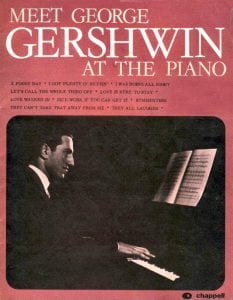
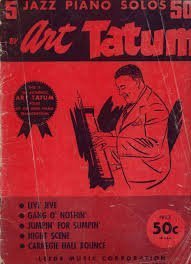
Art Tatum
Arthur Tatum Jr. (October 13, 1909 – November 5, 1956) was an American jazz pianist who is widely regarded as one of the greatest in his field.
Tatum grew up in Toledo, Ohio, where he began playing piano professionally and had his own radio program, rebroadcast nationwide, while still in his teens. He left Toledo in 1932 and had residencies as a solo pianist at clubs in major urban centers including New York, Chicago, and Los Angeles. Throughout his career, Tatum also played in after-hours venues at which he was said to be more spontaneous and creative than in his regular paid performances.
Art Tatum drank large quantities of alcohol when performing; although it did not negatively affect his playing, it damaged his health. In the 1940s, Tatum led a commercially successful trio for a short time and began playing in more formal jazz concert settings, including at Norman Granz-produced Jazz at the Philharmonic events. Granz recorded Tatum extensively in solo and small group formats in the mid-1950s, with the last session occurring only two months before the pianist’s death from uremia at the age of 47.
His playing encompassed the styles of earlier musicians, while adding harmonic and rhythmic imagination and complexity. Acclaimed for his virtuoso technique, Tatum extended the vocabulary and boundaries of jazz piano, and established new ground in jazz through innovative use of reharmonization, voicing, and bitonality.
Style and technique
Saxophonist Benny Green wrote that Tatum was the only jazz musician to “attempt to conceive a style based upon all styles, to master the mannerisms of all schools, and then synthesize those into something personal”. Tatum was able to transform the styles of preceding jazz piano through virtuosity: where other pianists had employed repetitive rhythmic patterns and relatively simple decoration, he created “harmonic sweeps of colour unpredictable and ever-changing shifts of rhythm.”
Musicologist Lewis Porter identified three aspects of Tatum’s playing that a casual listener might miss: the dissonance in his chords; his advanced use of substitute chord progressions; and his occasional use of bitonality (playing in two keys at the same time). There are examples on record of the last of these going back to 1934, making Tatum the farthest harmonically out of jazz musicians until Lennie Tristano.
On occasion, the bitonality was against what another musician was playing, as in “Lonesome Graveyard Blues” with guitarist Oscar Moore. Prior to Tatum, jazz harmony was mainly triadic, with flattened sevenths and infrequent ninths; he went beyond this, influenced by the harmonies of Debussy and Ravel. He incorporated upper intervals such as elevenths and thirteenths, and added tenths (and greater intervals) to the left-hand vocabulary of the earlier stride piano style.
Tatum had a different way of improvising from what is typical in modern jazz. He did not try to create new melodic lines over a harmonic progression; instead, he implied or played the original melody or fragments of it, while superimposing countermelodies and new phrases to create new structures based around variation. “The harmonic lines may be altered, reworked or rhythmically rephrased for moments at a time, but they are still the base underneath Tatum’s superstructures. The melodic lines may be transformed into fresh shapes with only a note or a beat or a phrase particle retained to associate the new with the original, yet the melody remains, if only in the listener’s imagination.”
This flexibility extended to his use of rhythm: he employed “ever-changing combinations of notes per beat even in the most rapid passages. He could apply different variation techniques simultaneously, and used subtle rhythmic intensification and relaxation to give clear identity and shape to his phrases.” His rhythmic sense allowed him to move away from the established tempo of a piece for extended periods without losing the beat.
For critic Martin Williams, there was also the matter of the pianist’s sly humor when playing: “when we fear he is reaching the limits of romantic bombast, a quirky phrase, an exaggerated ornament will remind us that Tatum may be having us on. He is also inviting us to share the joke and heartily kidding himself as well as the concert hall traditions to which he alludes.”
Prior to the 1940s, Tatum’s style was based on popular song form, which often meant two bars of melodic development followed by two more melodically static bars, which he filled with rapid runs or arpeggios.From the 1940s, he progressively lengthened the runs to eight or more bars, sometimes continuing them across the natural eight-bar boundaries within a composition’s structure, and began to use a harder, more aggressive attack.
He also increased the frequency of harmonic substitutions and the variety of musical devices played by his left hand, and developed a greater harmonic and contrapuntal balance across the piano’s upper and lower registers. Schuller argues that Tatum was still developing towards the end of his life – he had greater rhythmic flexibility when playing at a given tempo, more behind the beat swing, more diverse forms of expression, and he employed far fewer musical quotations than earlier in his career.
Critic Whitney Balliett commented on the overall form of Tatum’s style: “his strange, multiplied chords, still largely unmatched by his followers, his laying on of two and three and four melodic levels at once was orchestral and even symphonic.” This style was not one that could be adapted to the form of bebop: “the orchestral approach to the keyboard was too thick, too textured to work in the context of a bebop rhythm section.”
Tatum’s approach has also been criticized on other grounds: pianist Keith Jarrett objected to Tatum playing too many notes, and others have commented that Tatum often did not modify his playing when in a band.
A general criticism of him in a group setting was that he overwhelmed the other musicians, and appeared to compete with any soloist that he was ostensibly supporting. Clarinetist Buddy DeFranco said that playing with Tatum was “like chasing a train”, and the pianist himself said that a band got in his way.

A screen capture from the 1947 film The Fabulous Dorseys, showing Tatum’s straight-fingered technique
Tatum was serious at the keyboard, not attempting crowd-pleasing gestures, and he maintained a calm demeanor.This accentuated the impact of his playing on observers, as did his seemingly effortless technique, as fellow pianist Hank Jones observed – the apparently horizontal gliding of his hands across the keys stunned his contemporaries Tatum’s relatively straight-fingered technique, compared to the curvature taught in classical training, contributed to this visual impression: a critic wrote in 1935 that, when playing, “Tatum’s hand is almost perfectly horizontal, and his fingers seem to actuate around a horizontal line drawn from wrist to finger tip.”
Tatum was able to use his thumbs and little fingers to add melody lines while playing something else with his other fingers; drummer Bill Douglass, who played with Tatum, commented that the pianist would “do runs with these two fingers up here and then the other two fingers of the same hand playing something else down there. Two fingers on the black keys, and then the other two fingers would be playing something else on the white keys. He could do that in either hand”.
His large hands allowed him to play a left-hand trill with thumb and forefinger while also using his little finger to play a note an octave lower. He was also capable of reaching twelfth intervals in either hand, and could play a succession of chords such as the illustrated examples at high speed.He also had a strong sense of time and was able to play any of his chosen material in any key.

Examples of chords played by Tatum that “were easy for him to reach”
Tatum’s touch has also attracted attention: for Balliett, “No pianist has ever hit notes more beautifully. Each one was light and complete and resonant, like the letters on a finely printed page. Vast lower-register chords were unblurred, and his highest notes were polished silver.”Tatum could maintain these qualities of touch and tone even at the quickest tempos, when almost all other pianists would be incapable of playing the notes at all. Pianist Chick Corea commented that “Tatum is the only pianist I know of before Bill [Evans] that also had that feather-light touch – even though he probably spent his early years playing on really bad instruments.”
Among the musicians who said that Tatum could make a bad piano sound good were Billy Taylor and Gerald Wiggin The latter revealed that Tatum was able to identify and avoid using any keys on a bad piano that were not working, while guitarist Les Paul recounted that Tatum sometimes resorted to pulling up stuck keys with one hand, mid-performance, so that he could play them again.
Influence
Tatum’s improvisational style extended what was possible on jazz piano. The virtuoso solo aspects of Tatum’s style were taken on by pianists such as Adam Makowicz, Simon Nabatov, Oscar Peterson, and Martial Solal. Even “musicians of radically different outlook, such as Bud Powell, Lennie Tristano and Herbie Hancock, learnt key Tatum performances by rote, though few could compass his technical range or re-create his inimitable, plush tone.” Although Powell was of the bebop movement, his prolific and exciting style showed Tatum’s influence.Mary Lou Williams said, “Tatum taught me how to hit my notes, how to control them without using pedals. And he showed me how to keep my fingers flat on the keys to get that clean tone.”
Tatum’s influence went beyond the piano, however: his innovations in harmony and rhythm established new ground in jazz more broadly. He made jazz musicians more aware of harmonic possibilities by changing the chords that he used with great frequency; this helped lay the foundations for the emergence of bebop in the 1940s. He also pioneered modern chord voicing and chord substitution in jazz.
Browse in the Library:
| Artist or Composer / Score name | Cover | List of Contents |
|---|---|---|
| All Sondheim Vol IV Music and lyrics |
 |
All Sondheim Vol IV Music and lyrics |
| All That Jazz piano-vocal Arrangement |
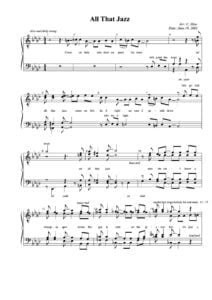 |
|
| All The Things You Are (Guitar And Tabs) | All The Things You Are (Guitar And Tabs) | |
| All The Things You Are (Guitar And Tabs) (Musescore File).mscz | ||
| All The Things You Are By Jerome Kern Guitar Transcription |
 |
|
| All The Things You Are Jerome Kern Oscar Hammerstein 2nd 1940 Jazz Standard (Vintage sheet music) |
 |
|
| All Time Standards (Songbook) Jazz Guitar Tablature Chord Melody Solos (Jeff Arnold) |
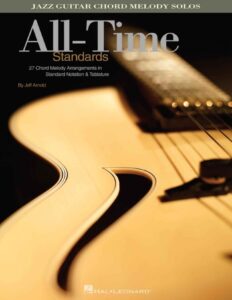 |
All Time Standards (Songbook) Jazz Guitar Tablature Chord Melody Solos (Jeff Arnold) |
| All Time Standards Piano (Arr. Gabriel Bock) |
 |
All Time Standards Piano (Arr. Gabriel Bock) |
| All You Need Is Ears George Martin with Jeremy Hornsby 1979 (Book) The story o the recording genius who created The Beatles |
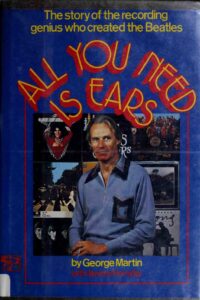 |
|
| Allan Holdsworth Just for the curious book Guitar with Tablature |
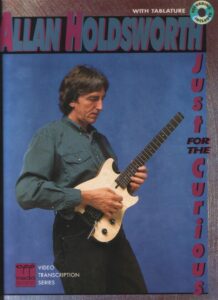 |
|
| Allan Holdsworth Melody Chords For Guitar |
 |
|
| Allan Holdsworth Super Guitarist with TABs |
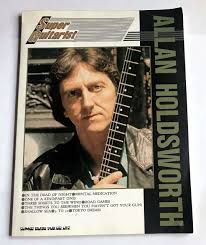 |
Allan Holdsworth Super Guitarist with TABs |
| Alle prese con una verde Milonga (Paolo Conte) | ||
| Allevi, Giovanni – Back To Life |
 |
|
| Allie Wrubel – Gone with the Wind |
 |
|
| Allman Brothers Guitar Songbook |
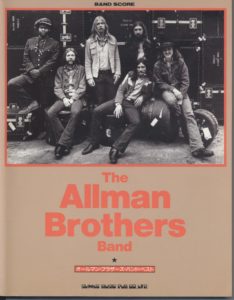 |
Allman Brothers Guitar Songbook |
| Allman Brothers, Best Of The (Piano, Vocal, Guitar) |
 |
Allman Brothers, Best Of The (Piano, Vocal, Guitar) |
| Allman Brothers, The – The Definitive Collection For Guitar Vol 1 with Tablature |
 |
Allman Brothers, The – The Definitive Collection For Guitar Vol 1 |
| Alma Redemptoris Mater |
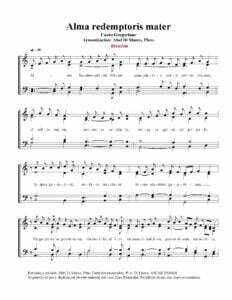 |
|
| Almeno tu nell’universo (Mia Martini) | ||
| Almir Chediak Ivan Lins Guitar Songbook Vol 2 |
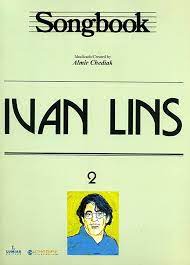 |
Ivan Lins Guitar Songbook Vol 1 by Almir Chediak |
| Alok – Hear Me Now Sheet Music |
 |
|
| Alone together (Howard Dietz & Arthur Schwartz) | Alone together (Howard Dietz Arthur SchwArtz) | |
| Alone Together (Musescore File).mscz | ||
| Alone Togheter Guitar Solo Transcription Jazz Standard |
 |
|
| Alphaville Forever Young (piano & Guitar) |
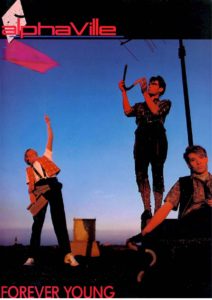 |
Alphaville Forever Young (piano & Guitar) |
| Also Sprach Zarathustra Op. 30 – Richard Strauss (Musescore File).mscz | ||
| Alternative Rock Sheet Music Collection |
 |
Alternative Rock Sheet Music Collection |
| Always on my mind – Elvis Presley – easy arrangement for piano, with fingering |
 |
|
| Amadeus – W.A. Mozart (film score arr. for piano solo by D. Fox) |
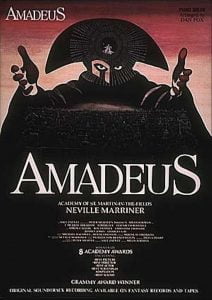 |
Amadeus – W.A.Mozart |
| Amadeus (original soundtrack piano solo arrangements) |
 |
Amadeus (Film score book) Piano Solos |
| Amalia Rodriguez FADOS Melodias De Sempre (GUITAR) |
 |
Amalia Rodriguez FADOS Melodias De Sempre (GUITAR) |
| Amando amando (Renato Zero) | ||
| Amar Pelos Dois (Salvador Sobral) | ||
| Amarcord (Nino Rota) | ||
| Amazing Grace – Tradicional (Piano ) |
 |
|
| Amazing Grace Traditional (Jazzy ver. sheet music) |
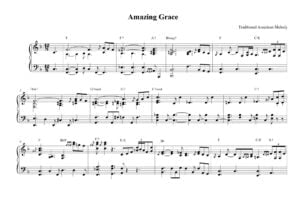 |
|
| Amazing Phrasing – Guitar 50 Ways to Improve Your Improvisational Skills (Guitar TABs Amazing Phrasing) (Tom Kolb) |
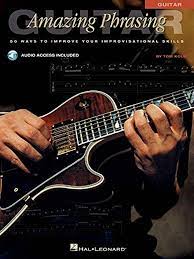 |
Amazing Phrasing – Guitar 50 Ways to Improve Your Improvisational Skills (Guitar TABs Amazing Phrasing) (Tom Kolb) |
| Amelie Poulain – 6 pieces for piano – Yann Tiersen – Yann Tiersen |
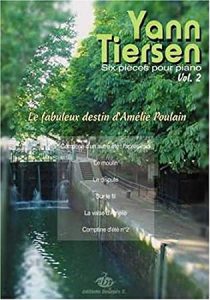 |
 |
| America (My Country ‘Tis of Thee Easy Piano Level 2 |
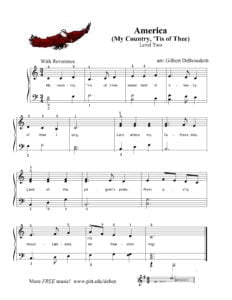 |
|
| America Greatest Hits Piano Vocal Guitar chords |
 |
America Greatest Hits Piano Vocal Guitar chords |
| America Greatest Hits (piano & Guitar) |
 |
America greatest |
| America Horse With No Name Piano vocal | America Horse With No Name Piano vocal | |
| America’s Songs The Stories Behind The Songs Of Broadway, Hollywood, And Tin Pan Alley (Philip Furia, Michael Lasser) Book |
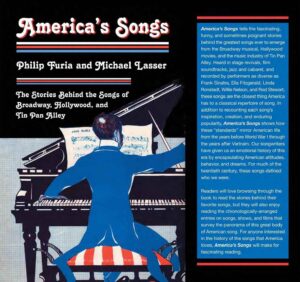 |
|
| American Folk Songs For Guitar with Tablature |
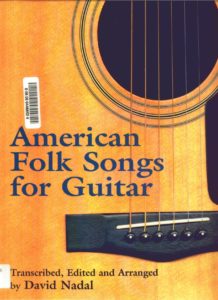 |
American Folk songs |
| American Folk Songs, My First Book of – Bergerac |
 |
|
| American Indian Melodies A. Farwell Op.11 (1901) |
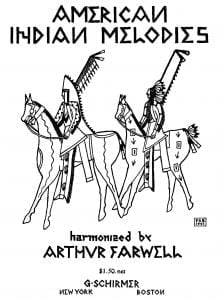 |
American Indian Melodies A. Farwell Op.11-min |
| American Pie (sheet music) |
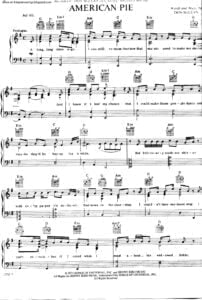 |
|
| American Popular Music (Book) by Larry Starr and Christopher Waterman |
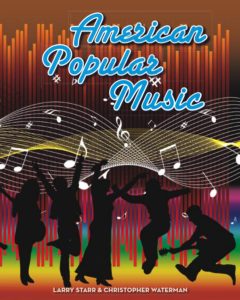 |
|
| Americana – Alegre, Magín (Guitarra) | Americana – Alegre, Magín (Guitarra) | |
| Amici Miei (Carlo Rustichelli) | ||
| Amor mio (Battisti) | ||
| Amore bello (Claudio Baglioni) | ||
| Amy Beach – Op.15 Four Sketches in Autumn |
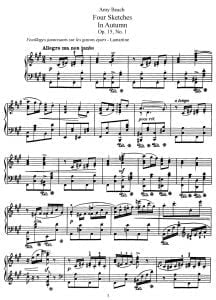 |
|
| Amy Grant – Breath Of Heaven | ||
| Amy MacDonald This Is The Life |
 |
AMY MACDONLAD |
| Amy Winehouse – Valerie |
 |
|
| Amy Winehouse – Valerie (sheet music) |
 |
|
| Amy Winehouse Amy Amy Amy |
 |
|
| Amy Winehouse Back To Black Songbook |
 |
Amy Winehouse Back To Black Songbook |
| Amy Winehouse Frank Songbook |
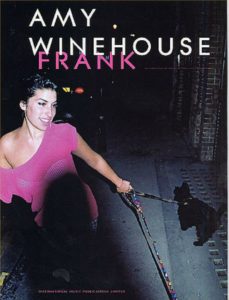 |
Amy Winehouse Frank |
| Amy Winehouse I Heard Love Is Blind |
 |
|
| Amy Winehouse Just Friends |
 |
|
| Amy Winehouse Rehab |
 |
|
| Amy Winehouse You Know Im No Good |
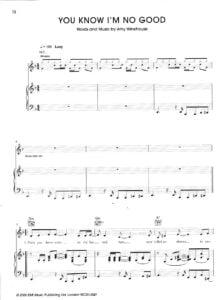 |
|
| An affair to remember (Harry Warren) | ||
| An American In Paris An George Gershwin (Concert Band)An American In Paris An George Gershwin (Concert Band) Arr. by Naohiro Iwai |
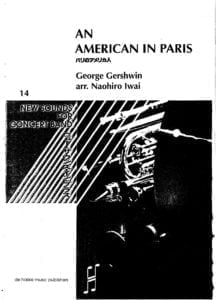 |
|
| An American Tail – The Marketplace – James Horner | ||
| An Introduction To Bach Studies (eBook) |
 |
|
| An Irish Blessing (Musescore File).mscz | ||
| An Irish Blessing (SATB) Choral | An Irish Blessing (SATB) | |
| Analisis musical claves para entender e interpretar la Música (M. y A. Lorenzo) Español |
 |
|
| Analysis Of Tonal Music An Schenkerian Approach Allen Cadwallader and David Gagné (Book) |
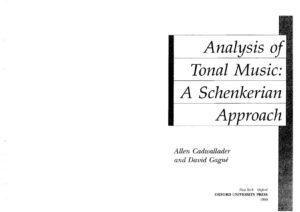 |
|
| Analyzing Bach Cantatas by Eric Chafe (eBook) |
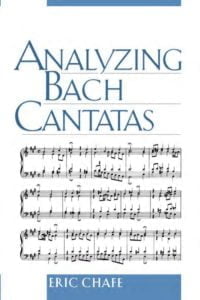 |
|
| Analyzing Schubert by Suzannah Clark (Cambridge Un. Press) (eBook) |
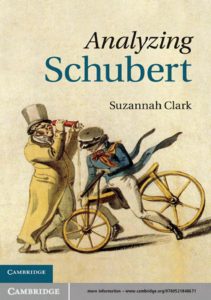 |
|
| Anastacia Not That Kind Songbook |
 |
Anastacia songbook |
| Anastasia Once Upon A December arr. by John Brimhall (Piano Solo 2 Versions Easy And Intermediate) |
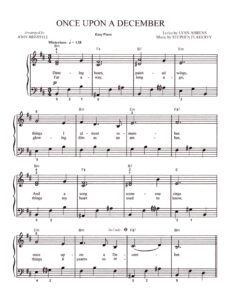 |
|
| Anastasia Sheet Music songbook Piano & vocal |
 |
Anastasia Sheet Music songbook Piano & vocal |
| Ancora ancora ancora (Mina) | ||
| Ancora qui (Django Unchained) Elisa – Ennio Morricone | ||
| And the Waltz goes on (Anthony Hopkins) | ||
| Andante (from String Quartet op. 22) P. I. Tchaikovsky | ||
| Anderson Freire – So Voce Piano |
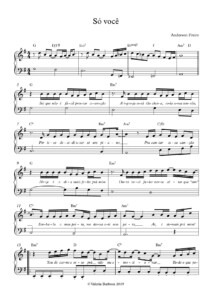 |
|
| Andras Schiff – Music Comes Out Of Silence Book |
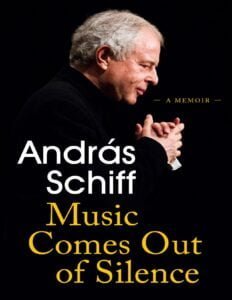 |
|
| Andre Gagnon – L’air Du Soir |
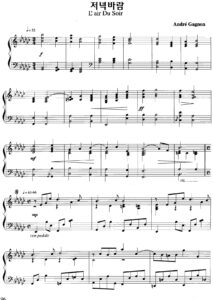 |
|
| Andre Gagnon – Le Reve De L’automne (sheet music Collection) |
 |
Andre Gagnon – Le Reve De L’automne (sheet music Collection) |
| Andre Gagnon – Les Jours Tranquilles | Andre Gagnon – Les Jours Tranquilles | |
| Andre Gagnon – Meguriai |
 |
|
| Andre Gagnon – Nelligan |
 |
|
| Andre Gagnon – Petite Nostalgie |
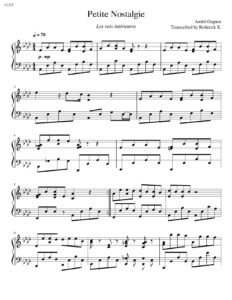 |
|
| Andre Gagnon – Reves D’Automne | Andre Gagnon – Reves D’Automne | |
| Andre Gagnon – The Very Best Of Andre Gagnon (Sheet Music Songbook) |
 |
Andre Gagnon – The Very Best Of Andre Gagnon (Sheet Music Songbook) |
| Andre Gagnon Ciel D’Hiver |
 |
|
| Andre Gagnon Entre Le Boeuf et l’Ane Gris Musique Traditionelle |
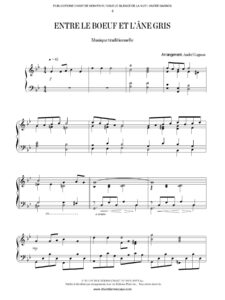 |
|
| André Gagnon L’air Du Soir |
 |
|
| Andre Gagnon Neiges |
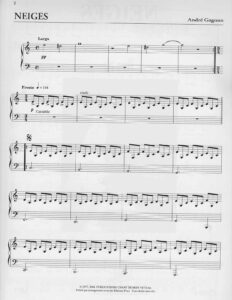 |
|
| André Gagnon Nelligan |
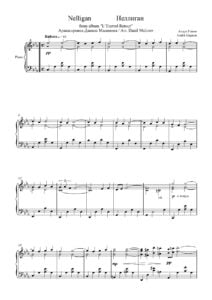 |
|
| André Gagnon Origami |
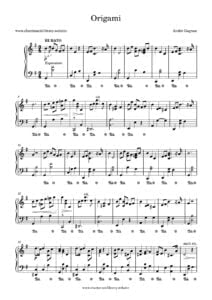 |
|
| André Gagnon Pensées Fugitives |
 |
|
| Andre Gagnon Pensées Fugitives |
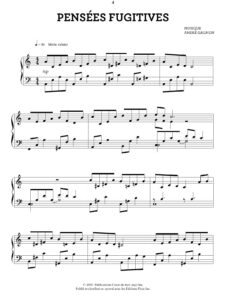 |
|
| André Gagnon Piano Solitude |
 |
Gagnon, André Piano Solitude |
| Andre Gagnon Prologue |
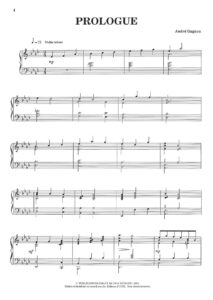 |
|
| André Gagnon Selection Speciale de chansons (partitions musicales) |
 |
André Gagnon Selection Speciale de chansons (partitions musicales) |
| André Gagnon Un Piano Sur La Mer (Piano Solo Partition Sheet Music) | Gagnon André Un Piano Sur La Mer (Piano Solo Partition Sheet Music) | |
| Andre Popp Paul Mauriat Love Is Blue Piano Solo Arr. |
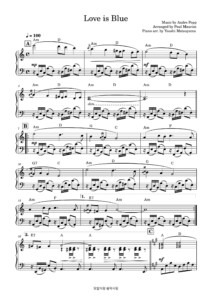 |
|
| André Previn – Play Like André Previn no. 1 |
 |
Andre Previn sheet music |
| Andre Previn – The Genius of (Piano Solos sheet music) |
 |
The genius of André Previn |
| Andre Rieu La Vie Est Belle (Songbook Collection As Performed By André Rieu) |
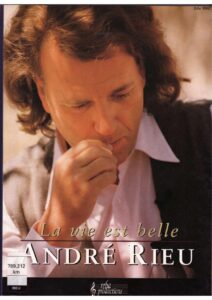 |
Andre Rieu La Vie Est Belle (Songbook Collection As Performed By André Rieu) |
| Andrea Bocceli – Time To Say Goodbye | ||
| Andrea Boccelli – Time To Say Goodbye |
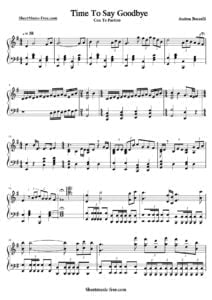 |
|
| Andrea Bocelli Romanza songbook (Guitar & Voice) |
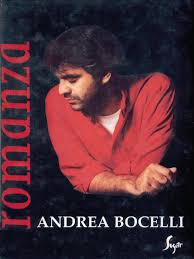 |
Andrea Bocelli Romanza songbook |
| Andrea Bocelli – Anthology (songbook) |
 |
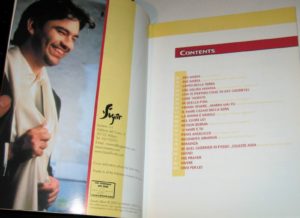 |
| Andrea Bocelli – Con te partiro (Time to say Goodbye) Piano Solo arr | Andrea Bocelli – Con te partiro (Time to say Goodbye) Piano Solo | |
| Andrea Bocelli – Con te partiro (Time to say Goodbye) Piano Solo.mscz | ||
| Andrea Bocelli – The Best Of Songbook |
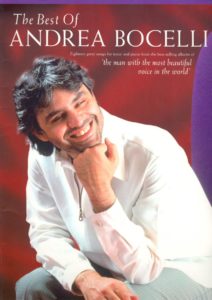 |
Andrea Bocelli best of |
| Andrea Bocelli Celine Dion The Prayer Easy Piano And Vocal By David Foster, Carole Bayer Sager, Alberto Testa And Tony Renis |
 |
|
| Andrea Bocelli Celine Dion – The Prayer – Easy Piano and Vocal by David Foster, Carole Bayer Sager, Alberto Testa and Tony Renis.mscz | ||
| Andrea Bocelli Cieli Di Toscana (Piano, guitar & Vocal) |
 |
Andrea Bocelli Cieli Di Toscana |
| Andrea Bocelli Sogno Songbook |
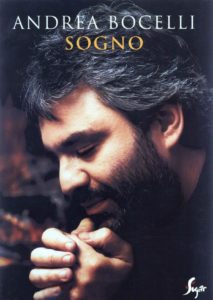 |
Andrea Bocelli sogno |
| Andrea Bocelli The Prayer |
 |
